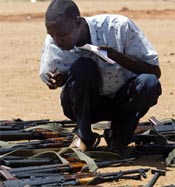 A retired Air Force colonel, John O’Toole, and an Israeli aeronautics engineer, Chanoch Miller, are the subjects of a recently unsealed indictment in connection with an alleged plan to ship 700 AK-47s to Somalia. What is most interesting about the indictment is that O’Toole is not only charged with illegal exports but also is charged with brokering violations — namely brokering the sale of defense articles to Somalia in violation of the arms embargo against Somalia and brokering the sale of these defense articles without first obtaining a brokering license from the State Department’s Directorate of Defense Trade Controls.
A retired Air Force colonel, John O’Toole, and an Israeli aeronautics engineer, Chanoch Miller, are the subjects of a recently unsealed indictment in connection with an alleged plan to ship 700 AK-47s to Somalia. What is most interesting about the indictment is that O’Toole is not only charged with illegal exports but also is charged with brokering violations — namely brokering the sale of defense articles to Somalia in violation of the arms embargo against Somalia and brokering the sale of these defense articles without first obtaining a brokering license from the State Department’s Directorate of Defense Trade Controls.
From the indictment it appears that O’Toole was mostly involved in arranging transportation of the rifles to Sudan, whereas Miller was in charge of procuring and selling the AK-47s. In exchange for O’Toole’s services, Miller was going to pay him a commission. This, of course, if true, appears to fit within the definition of brokering under section 129.2 of the ITAR. In particular, the definition of brokering in section 129.2(b) includes arranging for the transportation of defense articles.
What’s interesting here is that because of the brokering offenses, O’Toole is being charged with more counts than Miller, even though it’s not clear that a broker should be more culpable than an exporter. Both O’Toole and Miller are charged with an attempted export and a conspiracy to export. Miller can’t be charged with brokering on top of that because brokering requires an action taken “as an agent for others,” which is not the case for Miller because he bought the rifles himself and was acting on his own behalf in selling them. But what sensible policy would make O’Toole more culpable than Miller when Miller was selling the rifles and was just paying O’Toole to help him transport them?
[Hat tip to Laura Rozen for bringing the indictment to my attention]
 Permalink
Permalink
Copyright © 2010 Clif Burns. All Rights Reserved.
(No republication, syndication or use permitted without my consent.)

 Posted by
Posted by  Category:
Category: 

